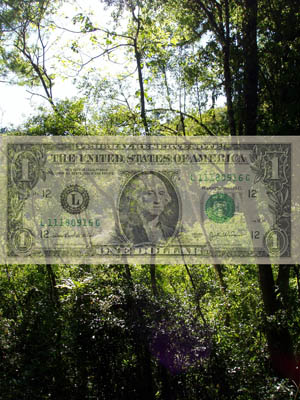Whos's going to bail out nature?
 It's a given that we're losing natural capital on an annual basis, but does it matter and what can we do about it?
It's a given that we're losing natural capital on an annual basis, but does it matter and what can we do about it?
During the periods of rapid economic growth we've experienced in recent years, the voices whispering in the background that we need to protect natural resources in order to have a secure financial future have been drowned out. As economies around the world slide into recession we might have some figures for environmental losses which put these economic woes into perspective.
Financial experts have variously put the value of the latest financial crash at somewhere between $1 and 1.5 trillion, but a review (The Economics of Ecosystems and Biodiversity) commissioned by the EU puts the annual value of forest loss at between $2 and 5 trillion. I'll repeat that, because I think it's important. The annual value of forest loss is between 2 and 5 TRILLION dollars.
Just how big will this number get when all other natural resource losses are taken into account? The rape of the seas, and the tragedy of bycatch and quotas, is well documented and could well run into the billions. And what happens when we include habitat and species losses through hunting, pollution, salinisation and desertification?
The world is nearly bankrupt. At what point is nature bankrupt?
To understand these figures it's important to understand just what nature does for us. For free. Forests filter entire water systems and circulate and soak up greenhouse gasses. If they are lost then we have to take counter measures such as building a reservoir (at great expense) or simply go without. Other tangible losses include the tourism cash that evaporates when forests are lost and the end result is always the same: it is very expensive. We have used up infinity and the depleting resources we rely on invariably cost more and more to get at, for smaller and smaller returns.
Adam Dutton, a wildlife economist from Oxford University, says: "If when deciding how much forest to cut down the forester actually had to pay for the loss in ecosystem services along with the cost of the workmen, tools and land then logging might fall to sustainable levels. The purpose of an environmental evaluation is to make some attempt at working out how large this payment might be."
There are also a host of less tangible benefits, such as the sheer beauty that wild places provide us, that should be taken into account when calculating nature losses.
But are numbers like 5 trillion too big to be taken seriously? Will they scare politicians into a numbness of inaction, and what about the man on the street or the man in the forest? Can numbers this huge ever mean anything to them?
Dutton goes on: "There are instances, such as CFCs, where stark economic messages in part helped to stimulate change. Unfortunately, in most circumstances, multi-lateral efforts are less productive as the self-interest of indiviudal nations undermines the net gain. These large scale valuations are important but can also disappear among a sea of fearful messages."